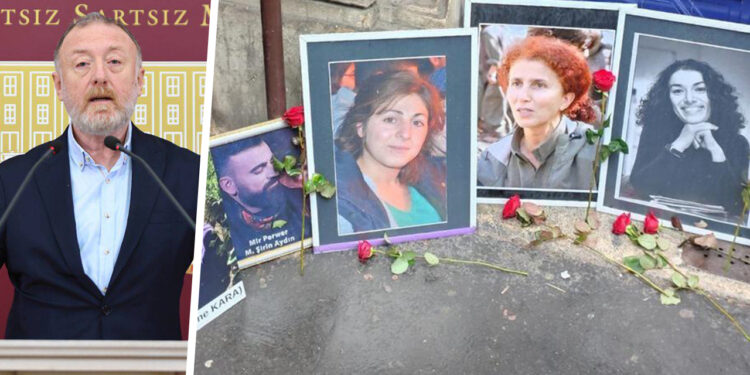Sezai Temelli, the Deputy Group Chairman of the People’s Equality and Democracy Party (DEM Party), has strongly denounced the continuous targeted killings of Kurdish politicians and activists, emphasising the dire need for a democratic resolution to the longstanding Kurdish conflict.

The perpetrators of assassinations and massacres against Kurds seek to obstruct a peaceful resolution to the Kurdish question, Sezai Temelli, Deputy Chairman of the Parliamentary Group of the Peoples’ Equality and Democracy Party (DEM), said on Tuesday.
Speaking at a press conference in the Turkish Parliament, Temelli reflected on the assassinations of Sakine Cansız, Fidan Doğan and Leyla Şaylemez in Paris on 9 January 2013 and the subsequent killing of three Kurdish activists at the same location in 2022. He also highlighted the assassination of three female Kurdish politicians in Turkey’s Kurdish-majority province of Şırnak (Şirnex) in 2016.
Temelli pointed out that these assassinations serve to obstruct the resolution of the Kurdish issue. He condemned the fact that the National Intelligence Agency (MİT) presents the extrajudicial killings as an achievement, stressing that such acts are illegal and nothing but irregular warfare.
The politician went on to draw attention to the lack of accountability for these atrocities, maintaining that the failure to investigate and prosecute those responsible reflects the current state of the system.
Temelli argued that a healthy system cannot exist while the Kurdish problem remains unresolved, describing it as Turkey’s greatest challenge. He called for a renewed focus on solving the Kurdish question and suggested that looking back to the day of the 2013 assassinations would provide a meaningful perspective for finding solutions.
The statement emphasised the potential for a solution through dialogue and identified Kurdistan Workers’ Party (PKK) leader Abdullah Öcalan as a key figure capable of facilitating such a solution. Temelli recalled the positive impact of past talks with Öcalan in resolving the Kurdish problem, contrasting this with the current harsh isolation imposed on him in Imrali, which he described as one of the darkest systems in the world.
Temelli concluded by calling on all citizens, including intellectuals and activists, to recognise the interconnectedness of the Kurdish problem with wider issues such as democracy, justice and the economy. He stressed that taking steps to resolve the Kurdish question would go a long way towards addressing other challenges facing the country. Calling for collective action to stop the ongoing violence and prevent further deterioration, Temelli said that now was the time for individuals to become advocates for peace.








Leave A Comment